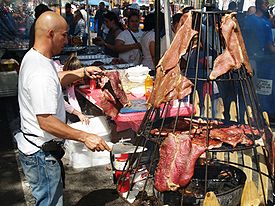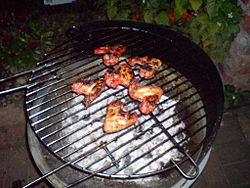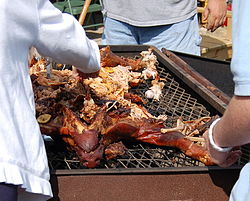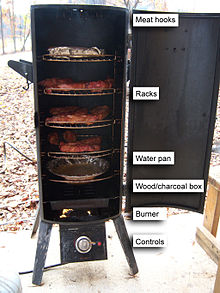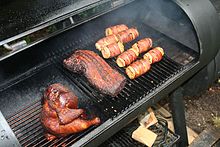- Barbecue
-
This article is about the cuisine. For the cooking appliance, see Barbecue grill. For other uses, see Barbecue (disambiguation).A barbecue at a street fair in New York City's East Village known as "Ternera a la Llanera" from the Colombian marshlands

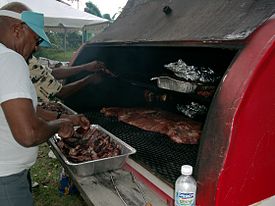 A barrel-shaped barbecue on a trailer at a block party in Kansas City. Pans on the top shelf hold hamburgers and hot dogs that were grilled earlier when the coals were hot. The lower grill is now being used to cook pork ribs and "drunken chicken" slowly.
A barrel-shaped barbecue on a trailer at a block party in Kansas City. Pans on the top shelf hold hamburgers and hot dogs that were grilled earlier when the coals were hot. The lower grill is now being used to cook pork ribs and "drunken chicken" slowly.
Barbecue or barbeque (common spelling variant)[1] (with abbreviations BBQ, Bar-B-Q and Barbie), used chiefly in the United States, Canada, the United Kingdom, New Zealand and Australia (called Braai in South Africa) is a method and apparatus for cooking meat, poultry and occasionally fish with the heat and hot smoke of a fire, smoking wood, or hot coals of charcoal.
The term as a noun can refer to the meat, the cooking apparatus itself (the "Barbecue grill" or simply "Barbecue") or to a party that includes such food or such preparation methods. The term as an adjective can refer to foods cooked by this method. The term is also used as a verb for the act of cooking food in this manner.
Barbecue is usually done in an outdoor environment by cooking and smoking the meat over wood or charcoal. Restaurant barbecue may be cooked in large brick or metal ovens specially designed for that purpose.
Barbecue has numerous regional variations in many parts of the world.
Contents
Etymology
The origins of both the activity of barbecue cooking and the word itself are somewhat obscure. Most etymologists believe that barbecue derives ultimately from the word barabicu found in the language of both the Timucua of Florida and the Taíno people of the Caribbean, which then entered European languages in the form barbacoa. The word translates as "sacred fire pit."[2] The word describes a grill for cooking meat, consisting of a wooden platform resting on sticks.
Traditional barbacoa involves digging a hole in the ground and placing some meat (usually a whole goat) with a pot underneath it, so that the juices can make a hearty broth. It is then covered with maguey leaves and coal and set alight. The cooking process takes a few hours.
There is ample evidence that both the word and cooking technique migrated out of the Caribbean and into other languages and cultures, with the word (barbacoa) moving from Caribbean dialects into Spanish, then Portuguese, French, and English. The Oxford English Dictionary cites the first recorded use of the word in the English language in 1697 by the British buccaneer William Dampier.[3] However, it appears 25 years earlier in the published writings of John Lederer in the proper form, barbecue, following his travels in the American southeast in 1672.[4]
Samuel Johnson's 1756 dictionary gave the following definitions:
- "To Barbecue – a term for dressing a whole hog" (attestation to Pope)
- "Barbecue – a hog dressed whole"[5]
While the standard modern English spelling of the word is barbecue, local variations like barbeque and truncations such as bar-b-q or bbq may also be found.[6] In the southeastern United States, the word barbecue is used predominantly as a noun referring to roast pork, while in the southwestern states, cuts of beef are often cooked.[7]
The word barbecue has attracted several inaccurate origins from folk etymology. An often-repeated claim is that the word is derived from the French language. The story goes that French visitors to the Caribbean saw a pig being cooked whole and described the method as barbe à queue, meaning "from beard to tail". The French word for barbecue is also barbecue, and the "beard to tail" explanation is regarded as false by most language experts. The only merit is that it relies on the similar sound of the words, a feature common in folk-etymology explanations.[8] Another claim states that the word BBQ came from the time when roadhouses and beer joints with pool tables advertised "Bar, Beer and Cues". According to this tale, the phrase was shortened over time to BBCue, then BBQ.[9]
The related term buccaneer is derived from the Arawak word buccan, a wooden frame for smoking meat, hence the French word boucane and the name boucanier for hunters who used such frames to smoke meat from feral cattle and pigs on Hispaniola (now Haiti and the Dominican Republic).[10] English colonists anglicised the word boucanier to buccaneer.
Styles
In British usage, barbecuing refers to a fast cooking process directly over high heat, while grilling refers to cooking under a source of direct, high heat—known in the US and Canada as broiling. In US English usage, however, grilling refers to a fast process over high heat, while barbecuing refers to a slow process using indirect heat and/or hot smoke (very similar to some forms of roasting). For example, in a typical U.S. home grill, food is cooked on a grate directly over hot charcoal, while in a U.S. barbecue, the coals are dispersed to the sides or at significant distance from the grate. Its South American versions are the southern Brazilian churrasco and the Argentine asado.
Alternatively, an apparatus called a smoker with a separate fire box may be used. Hot smoke is drawn past the meat by convection for very slow cooking. This is essentially how barbecue is cooked in most U.S. "barbecue" restaurants, but nevertheless, many consider this to be a distinct cooking process called hot smoking.
American South and Midwest
In the southern United States, barbecue initially revolved around the cooking of pork.[11] During the 19th century, pigs were a low-maintenance food source that could be released to forage for themselves in forests and woodlands. When food or meat supplies were low, these semi-wild pigs could then be caught and eaten.[12]
It was the Spanish who first introduced the pig into the Americas and to the American Indians. The Indians, in turn, introduced the Spanish to the concept of true slow cooking with smoke. The Spanish colonists came to South Carolina in the early 16th century and settled at Santa Elena. It was in that early American colony that Europeans first learned to prepare and to eat "real" barbecue. So, people were eating barbecue in South Carolina even before that name had been applied to the area by the English.[13]
According to estimates, prior to the American Civil War, Southerners ate around five pounds of pork for every one pound of beef they consumed.[14] Because of the poverty of the southern United States at this time, every part of the pig was eaten immediately or saved for later (including the ears, feet, and other organs). Because of the effort to capture and cook these wild hogs, pig slaughtering became a time for celebration, and the neighborhood would be invited to share in the largesse. In Cajun culture, these are called boucheries. These feasts are sometimes called 'pig-pickin's.' The traditional Southern barbecue grew out of these gatherings."[12]
Each Southern locale has its own particular variety of barbecue, particularly concerning the sauce. North Carolina sauces vary by region; eastern North Carolina uses a vinegar-based sauce, the center of the state enjoys Lexington-style barbecue which uses a combination of ketchup and vinegar as their base, and western North Carolina uses a heavier ketchup base. Lexington boasts of being "The Barbecue Capital of the World" and it has more than one BBQ restaurant per 1,000 residents.[15] Another distinguishing characteristic of Lexington barbecue is barbecue slaw, which has no mayonnaise, is composed of cabbage, ketchup, vinegar, and black pepper. Eastern North Carolina slaw contains cabbage, mayonnaise, yellow mustard,and salt with pickles and/or celery seed optional. Slaw can be served either on the side or in a sandwich. South Carolina is the only state that includes all four recognized barbecue sauces, including mustard-based, vinegar-based, and light and heavy tomato-based.[16] Memphis barbecue is best known for tomato- and vinegar-based sauces.[17] In some Memphis establishments[17] and in Kentucky, meat is rubbed with dry seasoning (dry rubs) and smoked over hickory wood without sauce; the finished barbecue is then served with barbecue sauce on the side.
The barbecue of Alabama, Georgia, and Tennessee is almost always pork served with a sweet tomato-based sauce. However, several regional variations exist as well. Alabama is particularly known for its distinctive white sauce, a mayonnaise- and vinegar-based sauce, originating in northern Alabama, used predominantly on chicken and pork. A popular item in North Carolina and Memphis is the pulled pork sandwich served on a bun and often topped with coleslaw. Pulled pork is prepared by shredding the pork after it has been barbecued.
Kansas City-style barbecue is characterized by its use of different types of meat (including pulled pork, pork ribs, burnt ends, smoked sausage, beef brisket, beef ribs, smoked/grilled chicken, smoked turkey, and sometimes fish), a variety attributable to Kansas City's history as a center for meat packing in the US. Hickory is the primary wood used for smoking in KC, while the sauces are typically tomato based with sweet, spicy and tangy flavor profiles. Burnt ends, the flavorful pieces of meat cut from the ends of a smoked beef or pork brisket, are popular in many Kansas City-area barbecue restaurants.
Pit-beef prevails in Maryland and is often enjoyed at large outdoor steer roasts, which are common in the warmer months. Maryland-style pit-beef is not the product of barbecue cookery in the strictest sense, as there is no smoking of the meat involved; rather, it involves grilling the meat over a high heat. The meat is typically served rare, with a strong horseradish sauce as the preferred condiment.[18]
The state of Kentucky, particularly Western Kentucky, is unusual in its barbecue cooking, in that the preferred meat is mutton. This kind of mutton barbecue is often used in communal events in Kentucky, such as political rallies, county fairs and church fund-raising events.
In much of the world outside of the American South, barbecue has a close association with Texas. Many barbecue restaurants outside the United States claim to serve "Texas barbecue", regardless of the style they actually serve. Texas barbecue is often assumed to be primarily beef. This assumption, along with the inclusive term "Texas barbecue", is an oversimplification. Texas has four main styles, all with different flavors, different cooking methods, different ingredients, and different cultural origins. (cf. Barbecue in the United States) In the June 2008 issue of Texas Monthly Magazine Snow's BBQ in Lexington was rated as the best BBQ in the state of Texas. This ranking was reinforced when New Yorker Magazine also claimed that Snow's BBQ was "The Best Texas BBQ in the World".[19]
Events and gatherings
The word barbecue is also used to refer to a social gathering where food is served, usually outdoors in the late afternoon or evening. In the southern USA, outdoor gatherings are not typically called "barbecues" unless barbecue itself will actually be on the menu, instead generally favoring the word "cookouts". The device used for cooking at a barbecue is commonly referred to as a "barbecue", "barbecue grill", or "grill". In North Carolina, however, "barbecue" is a noun primarily referring to the food and never used by native North Carolinians to describe the act of cooking or the device on which the meat is cooked.[20]
- Often referred to as "The World Series of Barbecue", The American Royal Barbecue Contest[21] is held each October in Kansas City, Missouri. This event comprises two distinct competitions held over the course of four days. The first contest is the Invitational Contest, with competing teams being required to obtain an invitation by winning other qualifying contests throughout the year. The second competition is an open contest that any team can compete in. This open contest is the largest championship barbecue competition in the world, with the 2007 event attracting 496 teams.
- The World Championship Barbecue Cooking Contest is held annually in Memphis, Tennessee, during the Memphis in May festival.[22] According to the Guinness Book of World Records, it is the world's largest pork barbecue contest.[23]
Other barbecue competitions are held in virtually every state in the United States during the warmer months, usually beginning in April and going through September. One of the best known was the Ribfest, first organized by former Chicago newspaper columnist Mike Royko, which attracted over 400 contestants in 1982, ballooned to 750 entries and over 10,000 attendees by 1990, and helped popularize the distinctions between different regional styles to a much wider audience. These events feature keen competitions between teams of cooks and are divided into separate competitions for the best pork, beef and poultry barbecue and for the best barbecue sauces.
Techniques
Barbecuing encompasses four or five distinct types of cooking techniques. The original technique is cooking using smoke at lower temperatures (usually around 240–270 °F or 115–125 °C) and significantly longer cooking times (several hours), known as smoking. Another technique is baking, utilizing a masonry oven or any other type of baking oven, which uses convection to cook meats and starches with moderate temperatures for an average cooking time (about an hour plus a few extra minutes). Yet another technique is braising, which combines direct dry heat charbroiling on a ribbed surface with a broth-filled pot for moist heat, cooking at various speeds throughout the duration (starting fast, slowing down, then speeding up again, lasting for a few hours). Finally, grilling is done over direct dry heat, usually over a hot fire (i.e., over 500 °F (260 °C) or 260 °C) for a short time (minutes). Grilling may be done over wood, charcoal, gas (natural gas or propane), or electricity.
Smoking
Smoking can be done with wood or charcoal, although many common commercial smokers use a gas, such as propane, to heat up a box of wet wood chips enough to cause smoke. The heat from the propane fire helps cook the meat while the smoke adds its unique flavor. The distinction between smoking and grilling is the heat level and the intensity of the radiant heat; indeed, smoking is often referred to as "low and slow". Additionally, during grilling, the meat is exposed to the open air for the majority of the time. During smoking, the BBQ lid or smoker door is closed, causing a thick, dense cloud of smoke to envelop the meat. The smoke must be able to move freely around the meat and out of the top of the apparatus quickly; otherwise, foul-tasting creosote will build up on the meat, giving it a bitter flavor. Smoked meats such as pork exhibit what is known as a smoke ring: a thin pink layer just under the surface which is the result of the nitric oxide in the smoke interacting with the myoglobin in the meat.[24]
Baking
See also: Pit barbecueThe masonry oven is similar to a smoke pit in that it allows for an open flame, but cooks much faster, and uses convection to cook. Barbecue-baking can also be done in traditional stove-ovens. It can be used to cook not only meats, but breads and other starches, and even various casseroles and desserts. It uses both direct and indirect heat to surround the food with hot air to cook, and can be basted much the same as grilled foods. In some cases, the grill can also function like a bakery oven by putting a drip pan below the cooking surface rack of a barbecue grill, as well as a baking sheet pan on top, combining two techniques simultaneously, or one right after the other, cooking twice, with a duration slightly longer than grilling.
Meat can also be baked in a pit in the ground, with hot coals and stones surrounding meat wrapped in wet burlap, wet leaves or aluminum foil.
Braising
It is possible to braise meats and vegetables in a pot on top of a grill. A gas or electric charbroil grill would be the best choices for what is known as barbecue-braising, or combining dry heat charbroil-grilling directly on a ribbed surface and braising in a broth-filled pot for moist heat. To braise, put a pot on top of the grill, cover it, and let it simmer for a few hours. There are two advantages to barbecue-braising: the first is that this method now allows for browning the meat directly on the grill before the braising, and the second is that it also allows for glazing the meat with sauce and finishing it directly over the fire after the braising, effectively cooking the meat three times, which results in a soft textured product that falls right off the bone.[25] This method of barbecue has a varying duration (depending on whether a slow cooker or pressure cooker is used), and is generally slower than regular grilling or baking, but faster than pit-smoking.
Other uses
The term barbecue is also used to designate a flavor added to foodstuffs, the most prominent of which are potato chips. This term usually implies a strong smoky flavor and often denotes a flavor reminiscent of barbecue sauce.
See also
- Barbecue cover
- Barrel barbecue
- Burnt ends
- Fire pot
- Jamaican jerk
- Ribfest
- Smoked meat
References
- ^ The spelling barbeque is given in Merriam-Webster OnLine (barbeque) as a variant spelling as well as in the Oxford English Dictionary (barbecue). The latter states that the spelling is a combination of "barbecue" and its abbreviated form "BBQ".
- ^ The Great American Barbecue and Grilling Manual by Smoky Hale. Abacus Publishing, 2000. ISBN 0-936171-03-0.
- ^ In his New Voyage Round the World, Dampier writes: And lay there all night, upon our Borbecu's, or frames of Sticks, raised about 3-foot (0.91 m) from the Ground.
- ^ The discoveries of John Lederer, in three several marches from Virginia, to the west of Carolina, and other parts of the continent: begun in March 1669 and ended in September 1670. Together with a general map of the whole territory which he traversed. Collected and translated out of Latine from his discourse and writings, by Sir William Talbot, baronet. London, Printed by J.C. for S. Heyrick, 1672.
- ^ Samuel Johnson's 1756 dictionary:
- To Barbecue – a term for dressing a whole hog (attestation to Pope)
- Barbecue – a hog dressed whole
- ^ The Marrow of the Bone of Contention: A Barbecue Journal by Jake Adam York. storySouth, winter 2003. Accessed 1-26-06.
- ^ Moley et al, "America Searches for the Perfect Barbeque". Newsweek, Volume 22, Issue 1. 1984.
- ^ http://www.worldwidewords.org/qa/qa-bar1.htm World Wide Words – Barbecue
- ^ Barebecue, BBQ by Cliff Lowe, from inmamaskitchen.com. Accessed 1-26-06.
- ^ Types of Pirates:The Buccaneers
- ^ A History of Barbecue
- ^ a b The History of Barbecue in the South from the American Studies website of the University of Virginia. Accessed 1-26-06.
- ^ http://scbarbeque.com/bbq-history/
- ^ Taylor, Joe Gray (1982). Eating, Drinking and Visiting in the Old South: An informal history. Baton Rouge: Louisiana State University Press. p. 27. ISBN 0807110132.
- ^ 2
- ^ South Carolina Barbeque Association
- ^ a b Memphis Style Barbecue
- ^ Raichlen, Steven (June 28, 2000). "How to Say Barbecue in Baltimore". The New York Times. http://query.nytimes.com/gst/fullpage.html?sec=travel&res=9501EFD81230F93BA15755C0A9669C8B63. Retrieved April 26, 2010.
- ^ By Meat Alone: The best Texas BBQ in the world. by Calvin Trillin. November 24, 2008. Accessed 5-18-10.
- ^ NCpedia – Barbecue
- ^ American Royal Barbeque Competition
- ^ Memphis in May Festival
- ^ [Guinness Book of World Records. Guinness. 1990.]
- ^ Understanding Food: Principles and Preparation by Amy Christine Brown, pg127
- ^ A New Way to Grill: Barbecue-Braising – Fine Cooking Article
External links
- US National Barbecue Association
- Barbecue Food Safety (US Dept. of Agriculture)
- The Internet BBQ FAQ
- Barbecue: A History of the World's Oldest Culinary Art Web cast from the Library of Congress. Barbecue expert Steven Raichlen gives an illustrated lecture on the history of BBQ. Retrieved August 21, 2009.
Cooking techniques Dry ConductionConvectionRadiationWet High heatLow heatIndirect heatFat-based High heatBlackening · Browning · Frying (Deep frying · Pan frying · Shallow frying · Stir frying (bao)) · SautéingLow heatMixed medium Device-based Non-heat See also American cuisine Historical Regional Allentown, Pennsylvania · California · Cincinnati · Kentucky · Hawaii · Midwestern · Chicago · New England · New Mexico · New York City · Omaha · Pacific Northwest · Philadelphia · Puerto Rico · Southern · Cajun · Creole · Lowcountry · Barbecue in Texas · Tex-Mex · Floribbean · Southwest · Western
Ethnic American Chinese · Soul food · Native American · Pennsylvania Dutch · Italian American · Tlingit
Miscellanea Barbecue · Christmas food · Cream cheese · Fast food · New American
Categories:- American cuisine
- Australian cuisine
- Australian culture
- Baking
- Barbecue
- Cooking appliances
- Cooking techniques
- Cuisine of the Southern United States
- Culture of St. Louis, Missouri
- Earth oven
- Fireplaces
- Garden features
- Meals
- Texas culture
- Canadian cuisine
Wikimedia Foundation. 2010.

